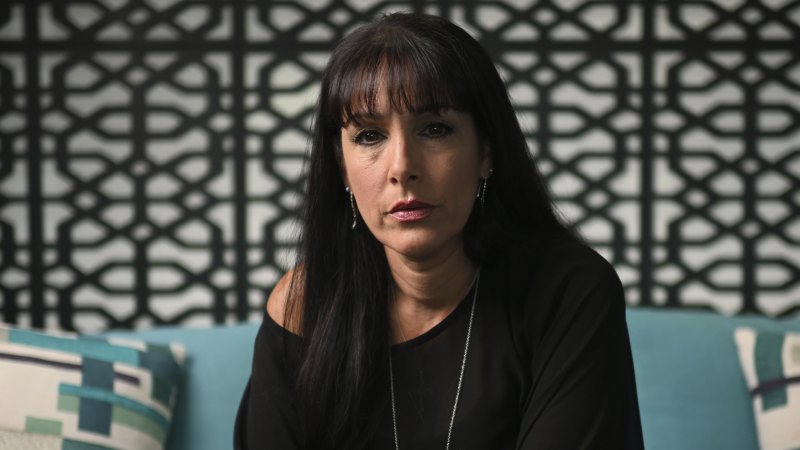Save articles for later
Add articles to your saved list and come back to them any time.
Methamphetamine is a relatively simple molecule: carbon, hydrogen, a little nitrogen.
Its simplicity belies its power. After being injected or smoked, it quickly crosses from the blood into the brain, where it forces a collection of neurotransmitters out of storage and into the synapses. Dopamine, noradrenaline and serotonin are dumped into the brain.
Andrea Simmons, a former ice addict, is now director of the Australian Anti Ice Campaign. She says quitting drugs was the hardest thing she’s ever done.Credit: Dan Peled
“It’s like no other feeling,” says former addict Andrea Simmons.
The drug is so powerful, regular use can quickly start to rewire the brain’s reward and motivation circuits. Getting more ice becomes the only motivation.
“I abandoned my life, my daughter,” says Simmons, who is now CEO of the Australian Anti Ice Campaign. “It was like I went into this whole other world I did not know existed.”
Addicts who want to get clean find themselves fighting their most fundamental brain systems. No wonder close to 90 per cent of people trying to quit ice relapse within a few years.
Professor Vasso Apostolopoulos in her lab this week.Credit: Jason South
Worse, there are few effective treatments to offer people trying to quit – and in terms of medications available to treat addiction or withdrawal, “the short answer is nothing”, says Liam Acheson, research officer at the national centre for clinical research on emerging drugs at Sydney’s St Vincent’s Hospital.
That has led Melbourne-based researchers to try an approach that, on the surface, seems strange. They want to make a vaccine for methamphetamine.
The COVID-19 vaccines generate antibodies to SARS-CoV-2; a methamphetamine vaccine could, theoretically, generate antibodies directly against the crystal methamphetamine particles in the bloodstream.
“People don’t think you can make a vaccine for drug addiction,” says Victoria University’s Professor Vasso Apostolopoulos. “They think vaccines are for infectious diseases, viruses, bacteria – but this works in the same way.”
Methamphetamine is a tiny, tiny molecule – too small for the immune system to notice. That’s why it does not generate antibodies itself and why it’s able to duck through the blood-brain barrier and into the neurons.
The trick, then, is to get the methamphetamine molecules to bind to a larger molecule – one that can be spotted by the immune system and can’t pass into the brain.
“Addicts are not going to get anything out of it, so they are not going to take it again,” says Apostolopoulos.
Proteins borrowed from tetanus and diphtheria have been trialled. Apostolopoulos went for something simpler: a complex of sugars borrowed from yeast, that has been studied as a vaccine candidate for decades.
In a study published in Vaccine last year, her team showed the vaccine produced antibodies against methamphetamine when administered to mice. Those antibodies were also able to bind to methamphetamine in a lab dish.
Most mice studies do not translate to humans – but the vaccine joins a long list of attempts to inoculate against addictive drugs, including morphine, heroin, opioids, cocaine and nicotine.
While promising in animals, the vaccines have floundered. A cocaine vaccine failed to generate a strong antibody response in a group of drug users, while nicotine vaccines have so far failed to beat a placebo.
There are a range of problems to be overcome. First, the addict must essentially go to war with their brain.
“A lot of the brain systems that are affected are pretty fundamental to our normal functioning. Disturb them too much and the person won’t be able to function,” says Professor Jason White, a University of South Australia addictive drug pharmacologist.
Another problem: speed. Our immune systems generally need time to build up antibodies to neutralise an invader. But injected or inhaled drugs hit our system in a rush. And they can be overcome by simply injecting more of the drug, putting users at risk of overdose.
Then there are the ethical questions.
“Who do you vaccinate? At-risk people? People who are willing to go into therapy?” says Dr Rachel Stephenson, a vaccine researcher at the University of Queensland.
“I think it’s great research to do, I think it’s really important. But it’s such a complex ethical issue.”
There’s also a broader problem, one society often struggles to appreciate: addiction is far more complex than just chemical dependency.
“It is often not just a medical problem, it’s a reflection of the larger society and environment people live in,” says Liam Acheson.
“There’s never going to be a magic pill.”
Liam Mannix’s Examine newsletter explains and analyses science with a rigorous focus on the evidence. Sign up to get it each week.
Most Viewed in National
From our partners
Source: Read Full Article


